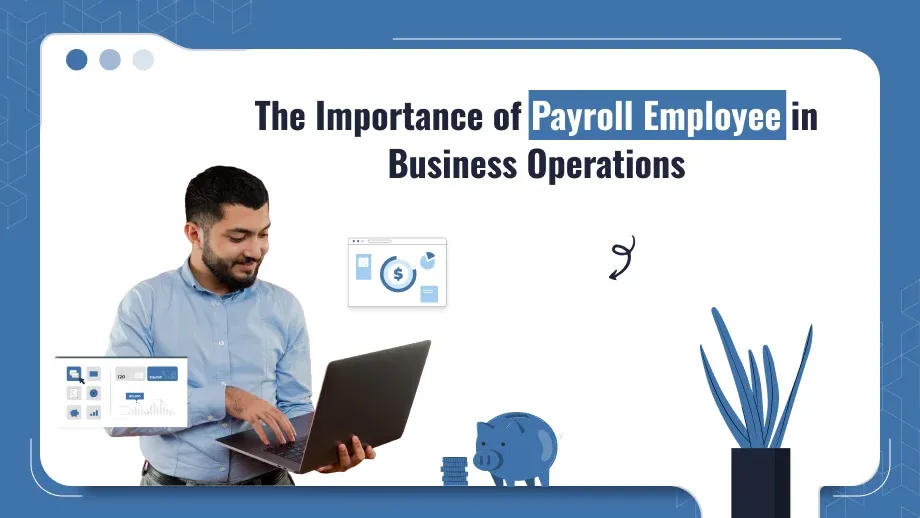
One of the most significant duties in any company is payroll, and payroll staff are crucial in ensuring that the right people are paid on time, taxes are withheld correctly, and all legal deadlines are met. Understanding the functions of pay staff will help you save time, reduce down on errors, and simplify your Payroll Processing, whether you’re a manager of HR or an entrepreneur with a small company.
Payroll employee play a very critical role in ensuring that any organization runs smoothly and that employee compensation is processed on time and without errors. It is not merely about issuing checks; they handle benefits, withhold taxes, and ensure compliance with labor laws.
For businesses, especially small and medium-sized enterprises, understanding the pivotal role of payroll employees helps optimize operational efficiency and prevents costly mistakes. By delegating payroll work to qualified employees or automated systems, organizations can focus on their core competencies while accurately maintaining records with fewer legal issues and higher levels of employee satisfaction.
What is a Payroll Employee?
Payroll employees control every aspect of a business’ employee compensation, which means calculating wages, processing timesheets, ensuring tax deductions, and delivering accurate paychecks. Their work is dependent on the size and type of organization but includes:
Process Payroll
This is primarily a task performed by the payroll employee. They make sure that the employee is paid at the correct time with every penny paid out on account of hours that they worked, salaries, or commissions.
Tax Computations and Withholding
Payroll employees determine the amount of federal, state, and local taxes, Social Security, and Medicare to withhold. They also determine benefits withheld for health insurance and retirement plans.
Compliance and Record Keeping
Payroll employee will be informed regarding changing tax and labor regulations as it pertains to the maintenance of federal and state compliance within an organization. All compensation to employee’s payroll files will be correct for audit purposes and reporting.
Employee Benefit Management
In general, most payroll employees will maintain the record in relation to employees’ benefit plans such as medical insurance, pensions, and any other form of employee fringe.
Addressing Payroll Issues
Payroll employees handle any discrepancies or issues employees may have with their pay, such as missing hours or incorrect payroll deductions. They investigate and resolve any payroll-related concerns quickly to avoid frustration.
The Skills to Become a Payroll Employee
The payroll employee’s job is the lifeline of an organization’s financial well-being and legal compliance. A payroll employee needs specialized skills for accuracy and punctuality in employees’ salaries, benefits, tax deductions, and other requirements while following legal procedures. Technical, interpersonal, and organizational skills are essential to the payroll employee’s work performance.
Attention to Detail
The most important skill of any payroll employee is an eye for detail. Even small mistakes in data entry, such as incorrect hours worked or tax calculations, can lead to serious issues, including payroll discrepancies, legal fines, or unhappy employees.The wrong entering of data, say for example errors in hours or tax calculations may lead to problems that are rather serious, and include payroll, legal fines or dissatisfied employees.
Mathematical Proficiency
Payroll is very number-related. Employees handling payroll employee work require a good track in math calculations, particularly determining gross pay, tax withholdings, benefits deductions, and overtime. They are to calculate any adjustment on raise, bonus, commission, and other variable pay factors. Keep in mind that they need to understand tax rates and be precise in applying payroll formulas in their daily transactions.
Familiarity with Payroll Software and Tools
Today, in a digital world, having knowledge about payroll software is indispensable. Most businesses utilize heavy payroll software for easy processes, automated calculations, and developing reports. Payroll staff should be fully aware of the various systems and know how to input data, run reports, and solve any problems that might come up. Recognition of the most known payroll platforms and payroll software can help to ease the process significantly.
Looking for a reliable payroll employee solution?
Get in touch today for a demo and streamline your payroll management!
Taxation and Compliance
A good employee payroll programs should, therefore, know all about the tax and law implications of running a payroll. This would range from federal tax laws, state tax laws, and local tax laws to the application of different types of rules connected with payroll. These include, but are not limited to, minimum wage laws, overtime pay computations, and even benefits regulations. The importance is to avoid legal complications and hefty penalties and fines. Payroll employees must know the changes, deadlines, and laws concerning taxes in order to deliver accurate information.
Confidentiality and Integrity
Payroll employees have access to the employees’ sensitive data such as salaries, bank details, and personal details. Confidentiality is a must in this job. Payroll employees must understand how important it is to protect that information and should follow strict procedures to avoid unauthorized access or leakage. Ethical integrity stands primary, particularly in this role where they handle confidential financial information, and trust forms the core aspect of their job.
Organizational and Time Management Skills
Payroll processing requires managing high volumes of information such as hours worked, vacation time, benefits, and tax documents. The payroll employee has to be highly organized and efficient to keep track of all the details and meet the payroll deadlines. Time management skills are also required because payroll is processed at a fixed schedule, and errors or delays can cause disruption to the whole business operation. The ability to prioritize tasks and work within tight deadlines ensures smooth payroll operations.
Problem-Solving Skills
Payroll matters such as miss-payments or tax errors and incorrect deductions cannot be avoided; therefore, he needs to promptly identify the problems, investigate and find a quick solution. Whatever it is-be it correcting mistakes, explaining what the deduction in pay is meant for to employees, or an issue with tax authorities, such a payroll worker must be sharp enough to reflect critically and look for payroll solutions very fast.
Communication Skills
Although payroll employees work with numbers and data, communication is the most important aspect of their job. They have to explain payroll-related issues to employees, managers, or even government agencies. Whether it is explaining pay stubs, explaining deductions, or answering questions, clear and professional communication is the key to building trust and avoiding misunderstandings. Payroll employees also have to communicate with HR and other departments to ensure that the information flows correctly.
Flexibility and Continuous Improvement
Payroll laws, tax regulations, and software tools are continually changing. To be successful payroll employees must be flexible and always willing to learn new skills or systems. This could be as simple as taking training on a new software tool or keeping abreast of legislative changes. Being proactive about continuous improvement helps ensure payroll processes remain smooth and compliant.
Customer Service Skills
Payroll employees are mostly involved with employees asking questions regarding their pay, taxes, or benefits. A good payroll employee must have a customer service orientation. They must provide timely and helpful responses to any payroll-related inquiry. A good payroll employee is patient, empathetic, and willing to help employees understand their pay or solve any problem they may be facing, thereby ensuring employee satisfaction.
Common Challenges Payroll Employees Face
The payroll employee is very important; however, they face a variety of challenges that include:
Staying Current on Changes in Rules and Regulations
Tax laws and labor laws are always in a state of change. The payroll employee must know what’s changing and adapt accordingly to avoid compliance problems.
Data Entry Errors
Minor data entry errors may result in payroll checks that have errors. Therefore, the employee must ensure accurate entry, and doing this manually increases the chances of mistakes.
Payroll Dispute Resolution
Many employees may come to a place of work disputing their payment, overtime, bonuses, or deductions. For this reason, the dispute arising from the issues should be timely resolved to increase employee satisfaction.
Complex Payroll for Large Teams
Companies handling large teams experience high complexity in dealing with payroll since the employees differ in their payroll structures, benefits, or even working hours and must be observed carefully.
What is an employee payroll tracker?
By keeping track of employees’ work hours, compensation, bonuses, deductions, taxes, and other important financial data, an employee payroll tracker assists businesses and human resources departments in efficiently managing payroll data. Payroll processing can be greatly simplified with a payroll tracker, which can also reduce mistakes, guarantee tax compliance, and improve the overall productivity of the company.
Key Features of an Employee Payroll Tracker
When selecting or designing an employee payroll tracker, there are several important features to look out for to ensure the system meets your business needs.
Time Tracking Integration
If your employees work hourly, the payroll tracker should integrate with time tracking tools or systems. This will automatically update hours worked, which reduces the need for manual data entry and eliminates timecard errors.
Automatic Calculations
It should calculate automatically all critical payroll metrics such as wages, overtime, bonuses, taxes, and deductions. These would reduce human errors and minimize the processing time involved in processing the payroll cycle.
Tax Deduction and Compliance Features
The most important feature of a payroll tracker is the management of tax deductions and compliance with government regulations. The system must be able to automatically calculate federal, state, and local tax withholdings and ensure that the business complies with tax rules and employment laws.
Employee Benefits Tracking
Payroll tracking tools should also provide for tracking benefits, including health insurance, retirement contributions, paid leaves, and other deductions, ensuring that these will be accurately included in the pay of an employee and properly deducted.
Direct Deposit Capability
A modern payroll tracker should have a direct deposit feature, allowing a business to deposit money directly into the employee’s bank account, which is also much faster, more secure, and efficient than the paper checks.
Report Generation
A payroll tracker should allow businesses to generate comprehensive reports about payroll expenses, tax filings, and reporting compliance documents. This is useful for audits, tax filings, and financial planning.
Customizable Settings
Every company is unique, and payroll trackers should allow customization to fit the specific payroll structures of a business. The features have to include custom pay rates, deductions, overtime rules, and bonuses, customized in accordance with your business’s payroll needs.
Security and Confidentiality
Since payroll data is sensitive information, payroll tracking systems must be secure. Be sure that the system offers data encryption, role-based access control, and meets data protection regulation requirements such as GDPR or HIPAA.
Payroll Employee Portal: A comprehensive guide
A Payroll Employee Portal is an online site through which the employee can log in to see their payroll and all the compensation-related information securely.It is a self-service tool where it will enable the employee easy access to pay stubs, tax forms, benefits information, and even updating personal details like address or bank account information. These portals have become essential for modern businesses as they help the HR and payroll team manage employee data more efficiently while giving employees more control over their payroll-related information.
What is a Payroll Employee Portal?
An employee portal payroll is a secure, web-based platform designed to give employees access to their payroll records, documents, and personal information.
The portal acts as a one-stop shop for employees to view and manage their pay-related matters, including:
- Pay stubs
- Tax documents (W-2, 1099 forms)
- Direct deposit setup
- Vacation and sick leave balances
- Benefits information (health insurance, retirement contributions)
- Personal contact details
- Such portals often are integrated into payroll management systems, HR platforms, or accounting software so employees can access such information easily, in real-time.
Conclusion
The payroll staff plays an integral role in managing the effective smooth operation of a business. That is through management of proper payroll calculations and processing of employee wages, tax withholding, and various other payroll employee benefits. This would eventually help keep track of all requirements under labor legislation. Thus, they become a vital support arm for the backbone of any organizational payroll system. With the complexity of payroll laws and tax regulations on the rise, the skills and responsibilities of payroll employees have become more important.







